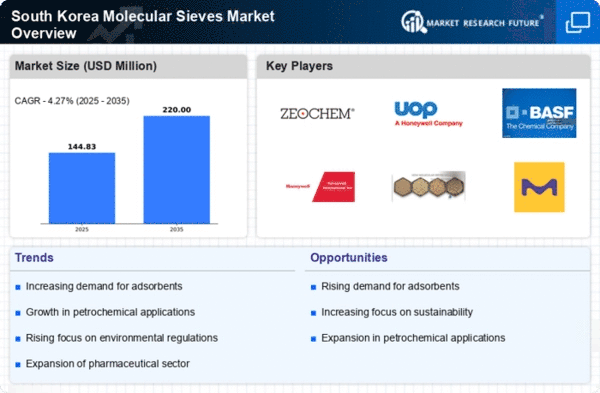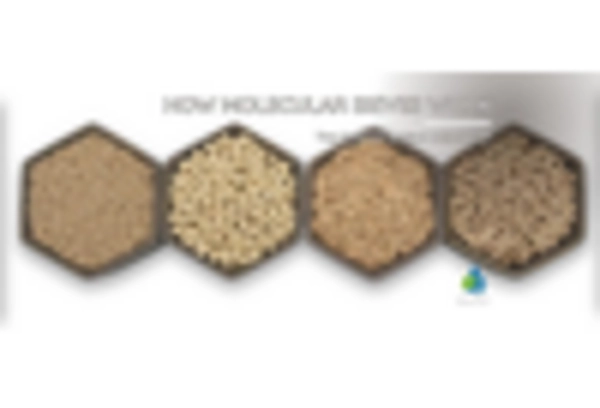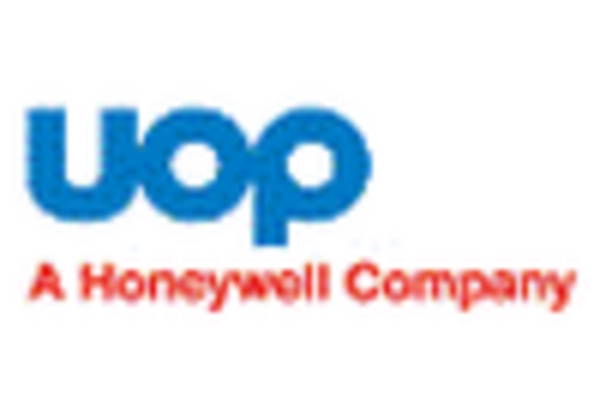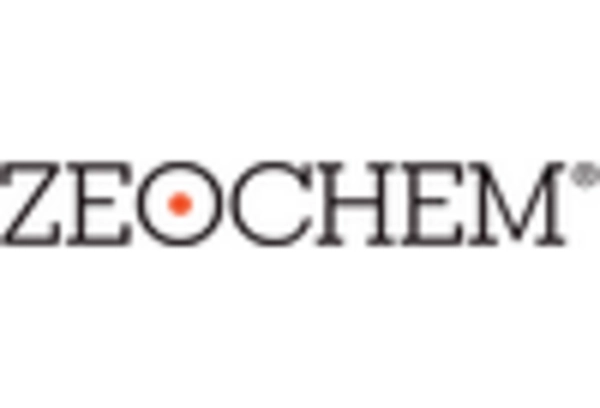The molecular sieves market in South Korea is characterized by a competitive landscape that is increasingly shaped by innovation, strategic partnerships, and a focus on sustainability. Key players such as Zeochem AG (CH), BASF SE (DE), and Honeywell International Inc. (US) are actively pursuing strategies that enhance their market positioning. Zeochem AG (CH) emphasizes product innovation and has recently expanded its portfolio to include advanced molecular sieve products tailored for specific industrial applications. Meanwhile, BASF SE (DE) is focusing on sustainability initiatives, aiming to reduce its carbon footprint through eco-friendly manufacturing processes. Honeywell International Inc. (US) is leveraging digital transformation to optimize its operations, thereby enhancing efficiency and customer engagement. Collectively, these strategies contribute to a dynamic competitive environment where innovation and sustainability are paramount.In terms of business tactics, companies are increasingly localizing manufacturing to better serve the South Korean market, which appears to be a response to the growing demand for customized solutions. Supply chain optimization is also a critical focus, as firms seek to enhance their responsiveness to market fluctuations. The market structure is moderately fragmented, with several key players exerting influence, yet the presence of smaller firms allows for a diverse range of offerings and competitive strategies.
In October Zeochem AG (CH) announced the launch of a new line of molecular sieves designed specifically for the petrochemical industry. This strategic move is likely to position the company as a leader in providing specialized solutions, catering to the unique needs of this sector. The introduction of these products may enhance Zeochem's competitive edge, particularly in a market that values tailored solutions.
In September BASF SE (DE) unveiled its commitment to achieving carbon neutrality by 2030, which includes the integration of sustainable practices in its molecular sieve production. This initiative not only aligns with global sustainability trends but also enhances BASF's reputation as a responsible corporate entity. The strategic importance of this move lies in its potential to attract environmentally conscious clients and partners, thereby expanding BASF's market share.
In August Honeywell International Inc. (US) launched a digital platform aimed at optimizing the supply chain for its molecular sieve products. This platform utilizes AI and machine learning to predict demand and streamline operations. The strategic significance of this development is profound, as it positions Honeywell at the forefront of digital innovation in the industry, potentially leading to improved customer satisfaction and operational efficiency.
As of November the competitive trends in the molecular sieves market are increasingly defined by digitalization, sustainability, and the integration of advanced technologies. Strategic alliances are becoming more prevalent, as companies recognize the value of collaboration in enhancing their capabilities. Looking ahead, competitive differentiation is likely to evolve from traditional price-based competition to a focus on innovation, technological advancement, and supply chain reliability. This shift underscores the importance of adapting to market demands and leveraging technological advancements to maintain a competitive edge.
















